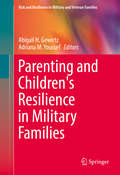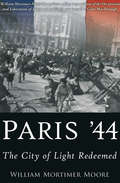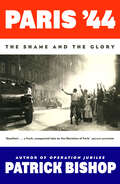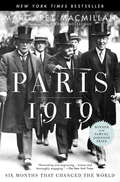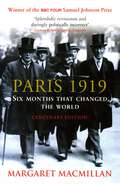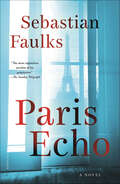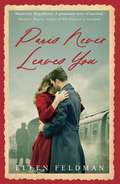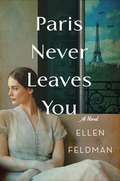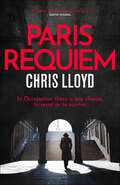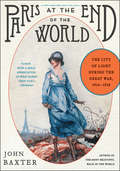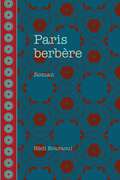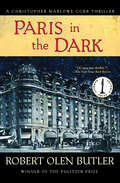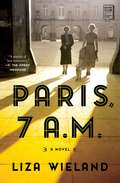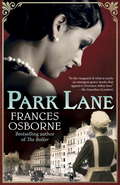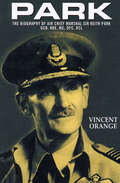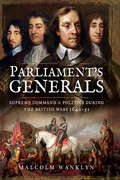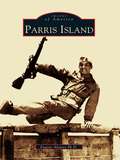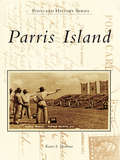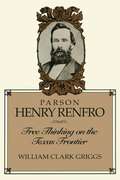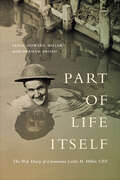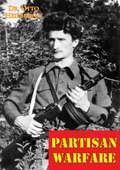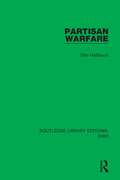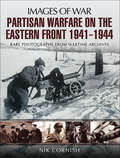- Table View
- List View
Parenting and Children's Resilience in Military Families
by Abigail H. Gewirtz Adriana M. YoussefThis reference examines the wide-ranging impact of militarylife on families, parenting, and child development. It examines the complex familyneeds of this diverse population, especially as familiar issues such as trauma,domestic violence, and child abuse manifest differently than in civilian life. Expertcontributors review findings on deployed mothers, active-duty fathers, and othermilitary parents while offering evidence for interventions and preventionprograms to enhance children's healthy adjustment in this highly structured yetuncertain context. Its emphasis on resource and policy improvements keepsthe book focused on the evolution of military families in the face of future changeand challenges. Included in the coverage: Impacts of military life on young children and their parents. Parenting school-age children and adolescents through military deployments. Parenting in military families faced with combat-related injury, illness, or death. The special case of civilian service members: supporting parents in the National Guard and Reserves. Interventions to support and strengthen parenting in military families: state of the evidence. Military parenting in the digital age: existing practices, new possibilities. Addressing a major need in family and parenting studies, Parenting and Children's Resilience inMilitary Families is necessary reading for scholars and practitioners interested in parenting and military family research.
Paris '44: The City of Light Redeemed
by William M. Moore"During the fall of 1944, once the Western Allies had gained military advantage over the Nazis, the crown jewel of Allied strategy became the liberation of Paris—the capital of France so long held in captivity. This event, however, was steeped in more complexity when the Allies returned than in 1940 when Hitler&’s legions first marched in. In 1944 the city was beset by cross-currents about who was to reclaim it. Was it to be the French Resistance, largely ephemeral throughout the war and largely Communist? Or was it to be the long-suffering Parisians themselves, many of them meantime collaborators? Or the Anglo-American armies which had indeed won the victory? Then there were the Free French forces led by Charles de Gaulle, and his second, General Leclerc, who now led a full (albeit American-supplied) armored division? The Germans, too, still retained a hand, with the option to either destroy the city, per Hitler&’s wishes, or honorably cede it. This book punctures the myth parlayed by Is Paris Burning? and other works that describe the city's liberation as mostly the result of the insurrection by the Resistance in the capital. In fact, de Gaulle gave Leclerc his orders for the liberation of the city as early as December 1943, and the General&’s great march down the Champs Élysées the day after the liberation was the culmination of a carefully laid plan to re-establish the French state. Amidst the swirling streams of self-interest and intrigue that beset the capital on the eve of its liberation, this book makes clear that Leclerc and his 2nd Armoured Division were the real heroes of the liberation and that marching on their capital city was their raison d'etre. At issue was the reconstitution of France itself, after its dark night of the soul under the Germans, and despite the demands of the Anglo-Americans and France&’s own insurrectionists. That a great power was restored is now manifest, with this book explaining how it was ensured. "
Paris '44: The Shame and the Glory
by Patrick BishopCelebrating the eightieth anniversary of the liberation of Paris, a heart-stopping countdown narrative recreating the liberation of Paris in 1944, one of the great hinge moments of WW2.The fall of Paris to the Nazis in June 1940 seemed like the darkest day of the Second World War; and the liberation of the city in August 1944 felt like the brightest.The liberation was a hinge moment of immense significance for the twentieth century, heralding the final victory of light over darkness and opening the door to a future free from fear. It was also the party of the century: champagne flowed freely, total strangers embraced - it was a celebration of life renewed against the backdrop of the world's favourite city, seen in by the likes of Ernest Hemingway, Lee Miller, JD Salinger, Picasso, and Robert Capa.This happy ending has come to feel as if it was pre-ordained. But there was nothing inevitable about it. Had things gone differently Paris might have gone down as a ghastly monument to Nazi nihilism, reduced to a rubble-strewn graveyard.This book, timed for the eightieth anniversary of the liberation of Paris, tells the story of those iridescent days in a startling new way. In a countdown narrative, packed with drama, heroism, joy—and heart-thumping suspense—the City of Lights' fate hangs in the balance.
Paris 1919: Six Months That Changed the World (Coleção Nova Fronteira Ser.)
by Margaret MacmillanWinner of the Samuel Johnson Prize Winner of the PEN Hessell Tiltman Prize Winner of the Duff Cooper Prize Between January and July 1919, after "the war to end all wars," men and women from around the world converged on Paris to shape the peace. Center stage, for the first time in history, was an American president, Woodrow Wilson, who with his Fourteen Points seemed to promise to so many people the fulfillment of their dreams. Stern, intransigent, impatient when it came to security concerns and wildly idealistic in his dream of a League of Nations that would resolve all future conflict peacefully, Wilson is only one of the larger-than-life characters who fill the pages of this extraordinary book. David Lloyd George, the gregarious and wily British prime minister, brought Winston Churchill and John Maynard Keynes. Lawrence of Arabia joined the Arab delegation. Ho Chi Minh, a kitchen assistant at the Ritz, submitted a petition for an independent Vietnam. For six months, Paris was effectively the center of the world as the peacemakers carved up bankrupt empires and created new countries. This book brings to life the personalities, ideals, and prejudices of the men who shaped the settlement. They pushed Russia to the sidelines, alienated China, and dismissed the Arabs. They struggled with the problems of Kosovo, of the Kurds, and of a homeland for the Jews. The peacemakers, so it has been said, failed dismally; above all they failed to prevent another war. Margaret MacMillan argues that they have unfairly been made the scapegoats for the mistakes of those who came later. She refutes received ideas about the path from Versailles to World War II and debunks the widely accepted notion that reparations imposed on the Germans were in large part responsible for the Second World War. A landmark work of narrative history,Paris 1919is the first full-scale treatment of the Peace Conference in more than twenty-five years. It offers a scintillating view of those dramatic and fateful days when much of the modern world was sketched out, when countries were created--Iraq, Yugoslavia, Israel--whose troubles haunt us still. From the Hardcover edition.
Paris 1919: Six Months that Changed the World
by Margaret MacMillanPreviously published as PeacemakersBetween January and July 1919, after the war to end all wars, men and women from all over the world converged on Paris for the Peace Conference. At its heart were the leaders of the three great powers - Woodrow Wilson, Lloyd George and Clemenceau. Kings, prime ministers and foreign ministers with their crowds of advisers rubbed shoulders with journalists and lobbyists for a hundred causes - from Armenian independence to women's rights. Everyone had business in Paris that year - T.E. Lawrence, Queen Marie of Romania, Maynard Keynes, Ho Chi Minh. There had never been anything like it before, and there never has been since.For six extraordinary months the city was effectively the centre of world government as the peacemakers wound up bankrupt empires and created new countries. They pushed Russia to the sidelines, alienated China and dismissed the Arabs, struggled with the problems of Kosovo, of the Kurds, and of a homeland for the Jews.The peacemakers, so it has been said, failed dismally; failed above all to prevent another war. Margaret MacMillan argues that they have unfairly been made scapegoats for the mistakes of those who came later. They tried to be evenhanded, but their goals - to make defeated countries pay without destroying them, to satisfy impossible nationalist dreams, to prevent the spread of Bolshevism and to establish a world order based on democracy and reason - could not be achieved by diplomacy. Paris 1919 (originally published as Peacemakers) offers a prismatic view of the moment when much of the modern world was first sketched out.
Paris Echo: A Novel
by Sebastian Faulks“Cunningly crafted. . . . France’s unquiet histories are brought to life by a master storyteller.”—Financial Times (UK)A story of resistance, complicity, and an unlikely, transformative friendship, set in Paris, from internationally bestselling novelist Sebastian Faulks.American historian Hannah intends to immerse herself in World War II research in Paris, wary of paying much attention to the city where a youthful misadventure once left her dejected. But a chance encounter with Tariq, a Moroccan teenager whose visions of the City of Lights as a world of opportunity and rebirth starkly contrast with her own, disrupts her plan. Hannah agrees to take Tariq in as a lodger, forming an unexpected connection with the young man. Yet as Tariq begins to assimilate into the country he risked his life to enter, he realizes that its dark past and current ills are far more complicated than he’d anticipated. And Hannah, diving deeper into her work on women’s lives in Nazi-occupied Paris, uncovers a shocking piece of history that threatens to dismantle her core beliefs. Soon they each must question which sacrifices are worth their happiness and what, if anything, the tumultuous past century can teach them about the future. From the sweltering streets of Tangier to deep beneath Paris via the Metro, from the affecting recorded accounts of women in German-occupied France and into the future through our hopes for these characters, Paris Echo offers a tough and poignant story of injustices and dreams.
Paris Never Leaves You: A Novel
by Ellen Feldman&‘Masterful, magnificent. A passionate story of survival. This story will stay with me for a long time.&’ Heather Morris, author of The Tattooist of AuschwitzThe war is over, but the past is never past …Paris, 1944. Charlotte Foret is working in a tiny bookstore in Nazi-occupied Paris struggling to stay alive and keep her baby Vivi safe. Every day they live through is a miracle until Vivi becomes gravely ill. In desperation, Charlotte accepts help from an unlikely saviour – and her life is changed forever. Charlotte is no victim. She is a survivor. But the truth of what happened in Paris is something she knows she can never share with anyone, including her daughter. Can she ever really leave Paris behind, and embrace the next chapter of her life? Seamlessly interweaving Charlotte&’s past in wartime Paris and her present in the 1950s world of New York publishing, Paris Never Leaves You is a heartbreakingly moving and unforgettable story of resilience, love – and impossible choices. &‘A thrilling achievement ... I was thoroughly drawn into a deep, rich, vivid world of engrossing characters and emotional and moral crises ... a great piece of writing in every way.' Forbes &‘This beautiful novel tells the bittersweet story of a young mother's strength and survival during WWII, effortlessly capturing the terror, immediacy, and inextinguishable human spirit.&’ Noelle Salazar, author of The Flight Girls 'With more twists and turns than the back streets of Paris, the story is as propulsively readable as a spy novel, and as rich and psychologically rewarding as only the finest literature can be.&’ Liza Gyllenhaal, author of Bleeding Heart &‘An exquisite novel that gives us what we&’re hungry for: an intelligent, complex female character who challenges our ideas of right and wrong, morality and immorality. Feldman achieves all of this with admirable precision and wit; she takes aim and does not miss.&’ Elizabeth J Church, author ofAll the Beautiful Girls 'Completely compelling. I tore through it. This novel pivots on how we manage to survive surviving ... Charlotte's visceral story will stay with me.&’ Naomi Wood, author of Mrs Hemingway
Paris Never Leaves You: A Novel
by Ellen Feldman"Masterful. Magnificent. A passionate story of survival and a real page turner. This story will stay with me for a long time." —Heather Morris, author of The Tattooist of Auschwitz and Cilka's JourneyLiving through World War II working in a Paris bookstore with her young daughter, Vivi, and fighting for her life, Charlotte is no victim, she is a survivor. But can she survive the next chapter of her life?Alternating between wartime Paris and 1950s New York publishing, Ellen Feldman's Paris Never Leaves You is an extraordinary story of resilience, love, and impossible choices, exploring how survival never comes without a cost.The war is over, but the past is never past.
Paris Requiem: From the Winner of the HWA Gold Crown for Best Historical Fiction
by Chris Lloyd'A terrific slice of historical noir... Sparkles with Lloyd's mordant wit and gallows humour, illuminating the depravity of an evil regime.' VASEEM KHAN'Paris Requiem is more than a historical crime novel, it's a tour de force.' ALIS HAWKINS'You have a choice which way you go in this war...'Paris, September 1940.After three months under Nazi Occupation, not much can shock Detective Eddie Giral. That is, until he finds a murder victim who was supposed to be in prison. Eddie knows, because he put him there. The dead man is not the first or the last criminal being let loose onto the streets. But who is pulling the strings, and why?This question will take Eddie from jazz clubs to opera halls, from old flames to new friends, from the lights of Paris to the darkest countryside - pursued by a most troubling truth: sometimes to do the right thing, you have to join the wrong side...****Praise for Chris Lloyd's Occupation series, featuring Detective Eddie Giral:'Ranks alongside Alan Furst and Philip Kerr ... Powerful stuff.' SUNDAY TIMES'A thoughtful, haunting thriller' MICK HERRON'Such a powerful and morally nuanced crime novel. Both a gripping murder mystery and a vivid recreation of Paris under German Occupation' ANDREW TAYLOR'It's up there with luminaries such as Philip Kerr, Sebastian Faulks and Manda Scott - in fact, it's probably better than all of those.' DAVID YOUNG'A haunting and eye-opening portrayal of life under occupation' ADELE PARKS'Lloyd does a masterly job of conjuring a hungry, defeated Paris. Eddie is a convincing protagonist; a flawed man trying his best to be a good one.' THE TIMES
Paris Requiem: From the Winner of the HWA Gold Crown for Best Historical Fiction
by Chris Lloyd'A terrific slice of historical noir... Sparkles with Lloyd's mordant wit and gallows humour, illuminating the depravity of an evil regime.' VASEEM KHAN'Paris Requiem is more than a historical crime novel, it's a tour de force.' ALIS HAWKINS'You have a choice which way you go in this war...'Paris, September 1940.After three months under Nazi Occupation, not much can shock Detective Eddie Giral. That is, until he finds a murder victim who was supposed to be in prison. Eddie knows, because he put him there. The dead man is not the first or the last criminal being let loose onto the streets. But who is pulling the strings, and why?This question will take Eddie from jazz clubs to opera halls, from old flames to new friends, from the lights of Paris to the darkest countryside - pursued by a most troubling truth: sometimes to do the right thing, you have to join the wrong side...****Praise for Chris Lloyd's Occupation series, featuring Detective Eddie Giral:'Ranks alongside Alan Furst and Philip Kerr ... Powerful stuff.' SUNDAY TIMES'A thoughtful, haunting thriller' MICK HERRON'Such a powerful and morally nuanced crime novel. Both a gripping murder mystery and a vivid recreation of Paris under German Occupation' ANDREW TAYLOR'It's up there with luminaries such as Philip Kerr, Sebastian Faulks and Manda Scott - in fact, it's probably better than all of those.' DAVID YOUNG'A haunting and eye-opening portrayal of life under occupation' ADELE PARKS
Paris at War: 1939-1944
by David DrakeDavid Drake chronicles the lives of ordinary Parisians during WWII, drawing on diaries and reminiscences of people who endured these years. From his account emerge the broad rhythms and shifting moods of the city and the contingent lives of resisters, collaborators, occupiers, and victims who, unlike us, could not know how the story would end.
Paris at the End of the World
by John BaxterA preeminent writer on Paris, John Baxter brilliantly brings to life one of the most dramatic and fascinating periods in the city's history. During World War I, the terrifying sounds of the nearby front could be heard from inside the French capital; Germany's "Paris Gun" and enemy aviators routinely bombarded the city.And yet in its darkest hour, the City of Light blazed more brightly than ever. Its taxis shuttled troops to the front; its great railway stations received reinforcements from across the world; its grand museums and cathedrals housed the wounded; and the Eiffel Tower hummed at all hours, relaying messages to and from the trenches. At night, Parisians lived with urgency and without inhibition, embracing the lush and the libertine. The rich hosted parties that depleted their wine cellars of the finest vintages. Artists such as Pablo Picasso achieved new creative heights. And the war brought a wave of foreigners to the city for the first time, including Ernest Hemingway and Baxter's own grandfather, Archie, whose diaries he uses to reconstruct a soldier's-eye view of the war years.Uncovering a thrilling chapter in Paris's history, John Baxter's revelatory new book shows how this extraordinary period was essential in forging the spirit of the city we love today.
Paris berbère
by Professeur Hédi BouraouiParis Berbère nous introduit dans la vie d’un couple franco-algérien, Théophile Deviau et de Tassadit Aït Mohand. Par delà la confrontation des colons et des colonisés et la porte de sortie par l’amour et la dignité, nous découvrons les différences qui unissent et séparent à la fois cet homme et cette femme. Paris Berbère dit bien le sort tragique des Algériens qui ont combattu pour la France, occulté de part et d’autre, est souligné dans un contexte romanesque à la trame complexe, où se croisent et s’entrecroisent de nombreux thèmes.
Paris in the Dark: A Christopher Marlowe Cobb Thriller (The Christopher Marlowe Cobb Thrillers #4)
by Robert Olen ButlerA novel of murder and espionage during the First World War: &“Rich atmosphere and a propulsive plot...a satisfying, stylish thrill.&”―The Tampa Bay Times Autumn 1915. World War I is raging across Europe, but Woodrow Wilson has kept Americans out of the trenches—though that hasn&’t stopped young men and women from crossing the Atlantic to volunteer at the front. Christopher &“Kit&” Cobb, a Chicago reporter with a second job as undercover agent for the U.S. government, is officially in Paris doing a story on American ambulance drivers, but his intelligence handler, James Polk Trask, soon broadens his mission. City-dwelling civilians are meeting death by dynamite in a new string of bombings, and the German-speaking Kit seems just the man to figure out who is behind them—possibly a German operative who has snuck in with the waves of refugees coming in from the provinces and across the border in Belgium. But there are elements in this pursuit that will test Kit Cobb, in all his roles, to the very limits of his principles, wits, and talents for survival. With Paris in the Dark, Pulitzer Prize winner Robert Olen Butler returns to his lauded Christopher Marlowe Cobb series and proves once again that he can craft &“a ripping good yarn&” (Wall Street Journal) with unmistakably literary underpinnings and a rich sense of the political and cultural atmosphere of the time. &“Best is Butler's feel for the black-and-white-movie atmospherics of a war zone after hours: It's a thrill to follow Kit to German hangouts like Le Rouge et le Noir, where a password will get you in, but there&’s no guarantee you'll get out.&”―Marilyn Stasio, The New York Times Book Review
Paris, 7 A.M.
by Liza WielandThe acclaimed, award-winning author of A Watch of Nightingales imagines in a sweeping and stunning novel what happened to the poet Elizabeth Bishop during three life-changing weeks she spent in Paris amidst the imminent threat of World War II.June 1937. Elizabeth Bishop, still only a young woman and not yet one of the most influential poets of the twentieth century, arrives in France with her college roommates. They are in search of an escape, and inspiration, far from the protective world of Vassar College where they were expected to find an impressive husband, a quiet life, and act accordingly. But the world is changing, and as they explore the City of Light, the larger threats of fascism and occupation are looming. There, they meet a community of upper-crust expatriates who not only bring them along on a life-changing adventure, but also into an underground world of rebellion that will quietly alter the course of Elizabeth’s life forever. Paris, 7 A.M. imagines 1937—the only year Elizabeth, a meticulous keeper of journals, didn’t fully chronicle—in vivid detail and brings us from Paris to Normandy where Elizabeth becomes involved with a group rescuing Jewish “orphans” and delivering them to convents where they will be baptized as Catholics and saved from the impending horror their parents will face. Poignant and captivating, Liza Wieland’s Paris, 7 A.M. is a beautifully rendered take on the formative years of one of America’s most celebrated—and mythologized—female poets.
Park LAne
by Frances OsborneThe bestselling author of The Bolter returns with a delicious novel about two determined women whose lives collide in the halls of a pedigreed London town home. When eighteen-year-old Grace Carlisle arrives in London in 1914, she's unable to fulfill her family's ambitions and find a position as an office secretary. Lying to her parents and her brother, Michael, she takes a job as a housemaid at Number 35, Park Lane, where she is quickly caught up in lives of its inhabitants--in particular, those of its privileged son, Edward, and daughter, Beatrice, who has just returned from America after being unceremoniously jilted by her fiancé. Desperate to find a new purpose, Beatrice joins the radical suffragist movement and strikes up an intriguing romance with an impassioned young lawyer. But unbeknownst to both of the young women, the choices they make will connect their chances at future happiness in dramatic and inevitable ways.
Park: The Biography of Air Chief Marshal Sir Keith Park, GCB, KBE, MC, DFC, DCL
by Vincent Orange&“A fine biography of one of the war&’s greatest unsung heroes,&” Royal Air Force Commander Keith Park (The Daily Telegraph). &“If ever any one man won the Battle of Britain, he did. I don&’t believe it is realized how much that one man, with his leadership, his calm judgement and his skill, did to save not only this country, but the world.&” So wrote Marshal of the RAF Lord Tedder of Keith Park in 1947. As commander of No. 11 Group, RAF Fighter Command responsible for the air defense of London and southeast England, Park took charge of the day-to-day direction of the battle. In spotlighting his thoughts and actions during the crisis, this biography reveals a man whose unfailing energy, courage, and cool resourcefulness won not only supreme praise from Winston Churchill, but the lasting respect and admiration of all who served under him. Few officers in any of the services packed more action into their lives, and Park covers the whole of his career: youth in New Zealand, success as an ace fighter pilot in World War I, postings to South America and Egypt, the Battle of Britain, command of the RAF in Malta 1942–43, and finally Allied Air Commander-in-Chief of Southeast Asia under Mountbatten in 1945. His contribution to victory and peace was immense and this biography does much to shed light on the Big Wing controversy of 1940 and give insight into the war in Burma, 1945, and how the huge problems remaining after the war&’s sudden end were dealt with. Drawn largely from unpublished sources and interviews with people who knew Park, and illustrated with maps and photographs, this is an authoritative biography of one of the world&’s greatest unsung heroes.
Parliament's Generals: Supreme Command and Politics during the British Wars, 1642–51
by Malcolm WanklynThe author of The Warrior Generals examines the machinations of the Parlimentarian military leadership during the English Civil War. Waller, Essex, Fairfax, Manchester, and Cromwell are among the most famous military men who fought for Parliament during the English Civil War. While their performance as generals has been explored in numerous books on the campaigns, comparatively little has been written by military historians about the political aspects of high command, namely the ever-changing and often fractious relationship with the English Parliament and its executive committees. With this book, Malcolm Wanklyn sheds light on the qualities these men employed in their attempts to achieve their military and political aspirations. In a series of insightful chapters, he follows their careers through the course of the conflict, focusing on their successes and failures in battle and the consequences for their reputations and influence. The author examines dissatisfaction with the leadership of Essex, Manchester, and Waller in the inconclusive early campaigns, as well as the contrasting strengths of Fairfax and Cromwell. This reassessment demonstrates how these commanders managed promotions, outmaneuvered their fellow generals, and controlled their subordinates.
Parris Island
by Eugene AlvarezLocated near the Palmetto State's historic city of Beaufort, the United States Marine Corps Recruit Depot, Parris Island, South Carolina is one of the world's most famous military bases. Having trained Marine recruits since World War I, the base is the oldest major post of the Marine Corps. It is also the first base commissioned exclusively to train United States Marines, and therefore may truly be called "The Cradle of the Corps." Parris Island takes the reader on a visual journey through documented photographs that highlight the base's touchstones. Before the American Revolution, the island was partially owned by Col. Alexander Parris, who became the island's namesake. Plantations flourished on Parris Island until the end of the War between the States. A small detachment of Marines first arrived in the late 1800s. It was not until 1915, however, that the Marines arrived for good. Since then, the base has rapidly expanded, first during World War I and more so during World War II. Over the years, much of the physical appearance of the base has changed; yet, through this collection of photographs, former Parris Island Marines will have a chance to relive some of their memories while new recruits can watch the progression of their base unfold.
Parris Island (Postcard History Series)
by Karen S. MontanoIn 1891, U.S. Marines were originally stationed on Parris Island to protect life and property as part of the Naval Station, Port Royal. In 1915, Parris Island officially became a Marine Corps Recruit Depot. Women became a permanent part of the U.S. Marine Corps in 1948. Today Parris Island boasts a historic district with homes and military structures built between 1891 and World War I, many of which are on the National Register of Historic Places. These postcards track the history of Parris Island and the rich heritage, character, and changes that mark it as the oldest major post in the U.S. Marine Corps.
Parson Henry Renfro: Free Thinking on the Texas Frontier
by William Clark GriggsThe years following the Texas Revolution held even more turbulent events as diverse droves of pioneers crossed the Sabine and Red Rivers to start new lives in Texas. Early Texas society contended with religious issues, family life in a rugged environment, and the Civil War. This cultural history was clearly reflected in the life of frontier preacher Henry C. Renfro. Migrating to Texas in 1851, Renfro enrolled in the fledgling Baylor University and became a Baptist preacher. Eventually disillusioned with Baptist orthodoxy, Renfro was disenfranchised on charges of infidelity as he embraced the ideals of the Free Thought Movement, inspired by the writings of men such as Thomas Paine, Spinoza, and Robert Ingersoll. Renfro's Civil War experience was no less unusual. Serving as both soldier and chaplain, Renfro left a valuable legacy of insight into the conflict, captured in a wealth of correspondence that is in itself significant. Drawing on a vast body of letters, speeches, sermons, and oral histories that had never before been available, this chronological narrative of "The Parson's" life describes significant changes in Texas from 1850 to 1900, especially the volatile formation and growth of Baptist churches in North Central Texas. William Griggs' study yields numerous new details about the Free Thought Movement and depicts public reaction to sectarian leaders in nineteenth-century Texas. The author also describes the developing Central Texas region known as the Cross Timbers, including the personal dynamics between a frontier family and its patriarch and encompassing such issues as property conflicts, divorce, and family reconciliation. This work unlocks an enlightening, engaging scene from Texas history.
Part of Life Itself: The War Diary of Lieutenant Leslie Howard Miller, CEF (The Canadian Experience of War)
by Leslie MillerThis extensively annotated wartime diary illuminates the military service of Leslie Howard Miller (1889–1979), a Canadian soldier who served in the First World War. Miller joined the Canadian Expeditionary Force (CEF) in 1914. In his off-duty hours, he kept this extraordinarily eloquent diary of his training, deployment overseas, service on the Western Front, and periods of leave in the United Kingdom. Graham Broad, working from a transcription of the diary produced by Miller’s family, includes a thorough introduction and afterword, as well as over 500 notes that situate and explain Miller’s many references to the people, places, and events he encountered. Unpublished for over a century, written in bracing and engaging prose, and illustrated with Miller’s own drawings and unseen photographs, Part of Life Itself illuminates a bygone world and stands as one of Canada’s most important wartime diaries.
Partisan Warfare
by Colonel The Hon. C. M. Woodhouse Dr Otto HeilbrunnDr Heilbrunn has already established himself as a historian of irregular warfare. But the subject is not merely a matter of past history, because the so-called 'nuclear stalemate', which has made total warfare improbable, has at the same time made limited warfare the only kind that the world can afford to risk. One hopes, naturally, that the risk will be avoided; but since even a conventional war of the traditional, pre-nuclear kind might easily lead unintentionally up to a total war between great powers and is therefore also likely to be avoided, there remains the residual danger of what may be called 'sub-conventional' warfare in marginal areas, which the great powers would be free to support or disown, to fan up or suppress, according to their immediate interpretation of their own interests. Such are the outbreaks which we have seen in recent years in Malaya, Vietnam, Algeria, Cyprus, Cuba, Laos and elsewhere. These are also, if Korea proves, as we hope, to have been the last conventional war between major powers, the kinds of war we must expect to see renewed in the future.The Resistance during the Second World War was the prelude to this new kind of warfare. It was not, of course, a new invention between 1940 and 1945: one remembers, on the contrary, the Spanish resistance during the Napoleonic Wars, which gave us the word guerrilla to add to our language, and the exploits of Lawrence and others during the Arab Revolt of 1917. But these were side-shows (Lawrence's own word) in support of a major conventional war, without which they would have achieved practically nothing. Since the Second World War, the corresponding outbreaks of irregular warfare have stood on their own as the major, if not the only, armed conflicts in their particular struggle, not a side-show in support of a major war elsewhere. The Spanish Civil War of 1936-8 is their archetype. Irregular warfare has accordingly become more professional and highly organized. It has had to acquire a sense of strategy, not merely of tactics. Perhaps eventually it will drop the epithet 'irregular'. Even by 1945 the 'partisans' of southern Europe and the Balkans had ceased to so describe themselves, and adopted instead the nomenclature of regular armies.Those who fought with the partisans of the Second World War will find that already there have been profound changes in the evolution of partisan warfare since 1945. But thanks to Dr Heilbrunn's keen sense of the continuity of that evolution, they will also recognize their own side-shows as forming an integral part of the history of this fascinating subject. He does us the honour of frequent quotation from our accounts of war-time experience; and it is encouraging to find that the lessons of that experience have been confirmed by later application elsewhere. His book is perhaps the first comprehensive study of the theoretical aspects of partisan warfare, at least in the English language. It is firmly grounded in practice, and likely to serve for a long time as a standard work.
Partisan Warfare (Routledge Library Editions: WW2 #23)
by Otto HeilbrunnThis book, first published in 1962, was the first systematic study of partisan war, investigating questions thrown up by the success of guerrillas in the Second World War, where they were never decisively beaten by regular armies. Drawing on lessons from Soviet Russia and China in particular, areas with especially active and large partisan forces, this book evolves a doctrine of guerrilla war in modern conditions, with an analysis of partisans in post-war Malaya, Kenya, Cyprus, Vietnam, Algeria, Cuba and Laos.
Partisan Warfare on the Eastern Front, 1941–1944 (Images of War)
by Nik CornishBetween 1941 and 1944, in the war on the Eastern Front, Soviet partisans fought a ruthless underground campaign behind the German lines. During those three terrible years of occupation they spied on the Germans, disrupted their communications, sabotaged road and rail routes and carried out assassinations and raids, and thousands of these irregular soldiers lost their lives. Yet their exploits are frequently overlooked in general histories of the conflict, and their experience of the war and their contribution to the Soviet victory are rarely recognized. That is why Nik Cornishs collection of photographs of the Soviet partisans is a landmark in the field. In a sequence of over 150 images, most of them previously unpublished, he gives a fascinating all-round portrait of the lives of the partisans and their struggle to resist and survive in a war that was waged with almost unparalleled cruelty on both sides. And, in his commentary, he outlines the history of the partisans - their desperate, chaotic beginnings in the wake of the German attack, their increasing coordination, daring and effectiveness as the war went on, and the key role they played as the Germans were forced back. He also records, through the photographs, the merciless counter-measures taken by the Germans and the reprisals. His book gives a compelling insight into one of the most important side shows of the Second World War.
